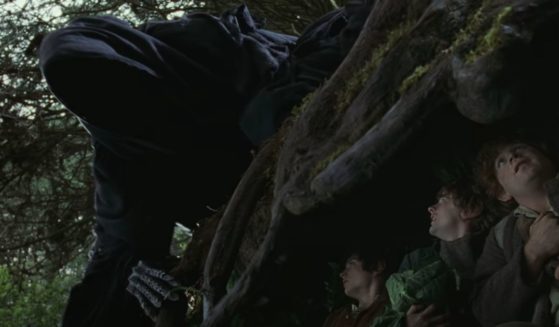Muslim Claims Attack While She Wore Hijab, Then Cops Say What Really Happened
Police say that a 13-year-old Virginia girl fabricated an incident in which she was attacked by a man while wearing her hijab, WUSA-TV reports.
The girl had originally told authorities that a black man had assaulted her and pulled off her hijab while calling her a terrorist.
“Police said the girl told police that she was walking in the area of Jato Ct. and Riverview Ln. Friday afternoon when she was approached by a black man,” WUSA says of the incident, which supposedly took place in the Prince William County town of Woodbridge, roughly 20 miles southwest of Washington, D.C.
“The girl alleged that the man cursed at the victim and then tried to put her arms behind her back. She then told police that he pulled out a small knife, placed it against her arms and called her a terrorist.
“Before fleeing, she accused the man of pulling off her hijab and covering her mouth so she could not scream for help.
“Upon further investigation of the reported incident, police determined that the victim falsely reported the incident and nothing actually happened.”
The 13-year-old is being charged as a juvenile with knowingly filing a false police report.
This isn’t the first time we’ve heard of an alleged false incident being reported to police over a hijab attack, either — although most seemed to come right after President Trump was elected in November of 2016.
The highest-profile hate-crime hoax was at the University of Louisiana Lafayette, where a student said that she was beaten, robbed and had her hijab ripped off by three men in an attack the day after the election.
Police later said the woman “admitted that she fabricated the story about her physical attack as well as the removal of her hijab and wallet by two white males” and that the “incident is no longer under investigation.”
Less than a month later, Baruch College student Yasmin Seweid made national headlines when she told police she had been accosted by drunken Trump supporters on the New York City subway. The men had allegedly spewed hate speech at her and tried to steal her hijab.
The police later said that Seweid had lied to her parents and police to avoid punishment for breaking curfew. She was charged with filing a false police report.
Hate crimes are obviously detestable things. However, so is fake hatred — and, in particular, the way that it’s covered.
As they like to say, breaking news makes the front page, retractions are buried on page 17. The way that these stories are reported often lead many to believe that the crimes actually occurred, since not as much is made about them after they’re discovered to be hoaxes. In particular, the Seweid case was reported as if there was no doubt behind the student’s narrative before it was debunked.
In this case, look at The Associated Press’ original headline on this story — “Man Calls Teen ‘Terrorist,’ Rips Off Headscarf at Knifepoint” — and the current headline for the report, “Police Say Girl Lied About Being Attacked Over Headscarf.”
In the first headline, there is no element of doubt — the girl was definitively attacked by a man who called her a terrorist when he ripped off her headscarf at knifepoint, even though there was no suspect in custody, much less a confession.
In the second headline, after the police investigated the case and arrested someone — namely, the girl who apparently made it up — the police only “say” that she made it up. This is quite proper; after all, the girl is only alleged to have filed a false police report and is presumed innocent until proven guilty. It’s not an element of doubt they were willing to introduce when the girl made her allegations, however, even though there was no suspect or direct evidence of the attack. The grisly details of the allegation — being attacked at knifepoint, having her hijab ripped off — also remain absent from the second headline.
This is the kind of reporting we see when the media covers these alleged hate crimes. The stories are almost always uncritical because they fit into the narrative of a “wave of hate” that’s overcome this country in the past few years, even those rises have been modest and mostly occurred under the Obama administration. (In fairness, hate crime statistics for Trump’s first year in office haven’t been released yet.)
When it turns out it’s a hoax, however, the story is pretty much buried and recorded with a kind of clinical blandness, as if to say “move on along, nothing to see here.” There’s no mention of a pattern or of previous high-profile hoax charges that are similar.
And people wonder why America has lost faith in the media and how it reports crimes.
Truth and Accuracy
We are committed to truth and accuracy in all of our journalism. Read our editorial standards.












